By Aaron Blake, The Washington Post
President Donald Trump’s interactions with Russia are largely a black box. As The Post has reported, he has gone to great lengths to conceal what he has talked about with Russian President Vladimir Putin, even seizing a translator’s notes and instructing the linguist not to disclose anything to other administration officials.
But we’re about to get a glimpse of just how the two sides talk to one another, when they think nobody is listening.
A federal judge on Thursday ordered the release of a transcript of Michael Flynn’s phone call with Russia’s ambassador after the 2016 election by May 31. This is the call Flynn would later lie to the FBI about, a crime to which he has pleaded guilty. The question has long been why he felt the need to lie about it.
The lie involved his denials that he and the ambassador, Sergey Kislyak, had discussed the Obama administration’s newly imposed sanctions. Those sanctions were in response to Russia’s interference in the 2016 election, and the Trump transition team worried that Russia would poison the well for future relations by responding with a huge sanctions package of its own.
According to the Mueller report and other legal filings, Flynn at the very least hinted that Russia might just want to bide its time until Trump was inaugurated.
From the Mueller report:
“… [Incoming deputy national security adviser K.T.] McFarland and Flynn discussed the sanctions, including their potential impact on the incoming Trump Administration’s foreign policy goals. McFarland and Flynn also discussed that Transition Team members in Mar-a-Lago did not want Russia to escalate the situation. They both understood that Flynn would relay a message to Kislyak in hopes of making sure the situation would not get out of hand.
“Immediately after speaking with McFarland, Flynn called and spoke with Kislyak. Flynn discussed multiple topics with Kislyak, including the sanctions, scheduling a video teleconference between President-Elect Trump and Putin, an upcoming terrorism conference, and Russia’s views about the Middle East. With respect to the sanctions, Flynn requested that Russia not escalate the situation, not get into a “tit for tat,” and only respond to the sanctions in a reciprocal manner.”
The day after the phone call, which was made when Flynn was in the Dominican Republican and intercepted by U.S. officials, Russian Foreign Minister Sergey Lavrov said Russia would respond with its own sanctions package. But just a couple hours after that, Putin overruled that and said there would be no retaliation. The Mueller report states that Flynn told McFarland he believed his phone call had helped.
The most obvious potential reason for Flynn’s lie was that he worried about what it would look like if people knew the incoming administration was trying and circumvent that actions of the present administration – not least in a manner involving Russia, which had interfered to help Trump in 2016. There is also a seldom-invoked federal law called the Logan Act that prevents private citizens from conducting diplomacy with foreign governments. According to the Mueller report, both the FBI and the Trump team looked into whether Flynn had violated that law.
But apart from the general thrust of the phone call and the “tit for tat” quote, we don’t really know a whole lot about how this conversation transpired. How explicit was that request? Was there some kind of a quid pro quo? Was Trump invoked?
Against the backdrop of Trump’s friendly public posture toward Russia, the actual phone call could be instructive. If Flynn was kowtowing to Russia in any way, it would really fill out the picture of an incoming administration that wasn’t terribly concerned about getting tough on Russia for its 2016 actions.
It’s important to emphasize that whatever Flynn and Kislyak talked about, though, it’s not clear that Trump authorized it. While the Mueller report says transition team officials worried about retaliatory sanctions, were aware of Flynn’s phone call and strategized about what to communicate to Russia, it says “the investigation did not identify evidence that the President-Elect asked Flynn to make any request to Kislyak.”
But Trump had indicated publicly that he didn’t much appreciate the looming sanctions battle. “I think we ought to get on with our lives,” he said. And after Putin made his announcement, Trump tweeted, “Great move on delay (by V. Putin).”
This little peek behind the curtain could prove interesting.









